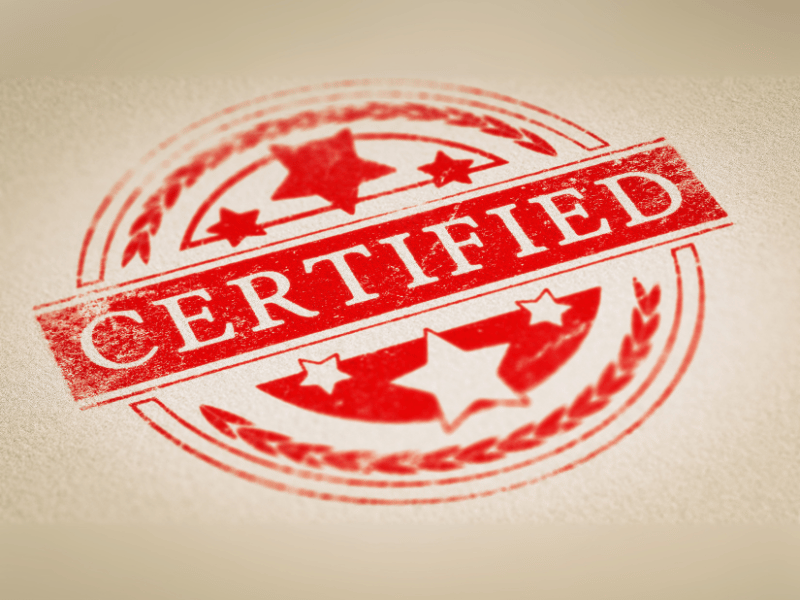Understanding OEKO-TEX Certification: A Guide

In the world of textiles, the term OEKO-TEX certified is gaining prominence. But what does it mean?
OEKO-TEX is an international association that focuses on textile safety and sustainable production. It offers various certifications that ensure textile products are free from harmful substances and safe for human use.
But why should you care about OEKO-TEX certification?
For consumers, it provides assurance about the safety and sustainability of the products they purchase. For manufacturers, it's a testament to their commitment to ethical and environmentally friendly practices.
In this guide, we'll delve deeper into what OEKO-TEX certification is, its importance, and how it impacts both consumers and manufacturers.
Whether you're a conscious consumer, a textile industry professional, or simply curious, this guide will help you understand the significance of OEKO-TEX certification in the textile industry.
What is OEKO-TEX Certification?
OEKO-TEX certification is a pivotal mark in the textile industry. It signals that a product meets high safety standards. This certification ensures products are free from harmful substances.
OEKO-TEX originates from an international association. This body includes independent research and test institutes. They focus on ensuring safety and sustainability in textile production.
Various certifications and labels fall under the OEKO-TEX umbrella. Each serves a unique purpose. They address different aspects of textile safety. STANDARD 100 by OEKO-TEX is particularly noteworthy.
STANDARD 100 is one of the most recognized labels in the world. It covers textiles tested for harmful substances. It is especially popular for products used by sensitive populations.
Certification is not mandatory. However, it is highly valued. Companies opt for it voluntarily and renew annually. This commitment reflects ongoing compliance with strict standards.
The certification process is rigorous. It involves thorough laboratory testing. This testing covers both regulated and non-regulated harmful substances.
Criteria for testing depend on the intended product use. Stricter criteria apply to products for babies and children. These standards ensure maximum safety.
Every stage of textile production can receive OEKO-TEX certification. This includes from raw materials to finished goods. The broad coverage enhances the assurance of product safety.
OEKO-TEX certification ensures not only safety but also ethical production. It aligns with sustainable and responsible practices. This makes it a holistic approach to textile manufacturing.
OEKO-TEX certification is globally recognized. It raises the bar for safety and sustainability in the textile industry. This makes it an invaluable asset for both producers and consumers alike.

The Importance of OEKO-TEX Certification for Consumers and the Environment
OEKO-TEX certification plays a crucial role for consumers who prioritize health. It reassures them that the textiles they use are safe. This is vital for those with allergies or sensitive skin.
Consumers gain confidence from OEKO-TEX labels. These labels signify adherence to stringent safety standards. They simplify making informed purchasing decisions.
The environmental benefits of OEKO-TEX certification are equally significant. It supports eco-friendly practices throughout the textile production lifecycle. This leads to reduced environmental impact.
OEKO-TEX encourages manufacturers to adopt better environmental practices. This results in lower ecological footprints for textile producers. It is part of a broader movement towards sustainability.
The certification also addresses ethical manufacturing concerns. It ensures that textiles are produced under socially responsible working conditions. This contributes to improved worker safety and fair labor practices.
Globally recognized, OEKO-TEX certification serves as a benchmark. It is trusted as a standard for both safety and sustainability. This trust extends throughout the supply chain.
By driving industry-wide improvements, OEKO-TEX also helps protect natural resources. It fosters the responsible use of resources, promoting long-term sustainability. The ripple effects extend beyond textiles, benefiting the wider community.
Ultimately, OEKO-TEX certification ensures safe, sustainable textiles. It provides peace of mind for consumers and a greener planet. This underscores the importance of supporting OEKO-TEX initiatives.

Different Types of OEKO-TEX Certifications
STANDARD 100 by OEKO-TEX
STANDARD 100 by OEKO-TEX is a highly recognized label in textiles. It signifies that a product has been tested for harmful substances. This testing covers every stage of production, from yarn to the finished product.
The label is applicable to a wide range of textile items. It includes apparel, home textiles, and accessories. This breadth ensures comprehensive consumer protection across various textile uses.
One of the unique aspects of this label is its stringent requirements for baby products. These requirements are more demanding given the sensitive nature of children's skin. Thus, parents can rely on STANDARD 100 when choosing textiles for their families.
The STANDARD 100 certification must be renewed annually. This ongoing certification ensures compliance with updated safety requirements. It reflects a commitment to continuous product safety.
This certification serves as a reliable indicator for consumers. It reassures them about product safety and ecological compatibility. As such, it stands as a testament to superior safety standards.
MADE IN GREEN by OEKO-TEX
MADE IN GREEN by OEKO-TEX goes beyond just safety. It is a traceable label that reflects sustainable production. This traceability reassures consumers about the product's ethical origins.
Products with this label are produced using environmentally friendly processes. Additionally, they are made under socially responsible working conditions. This combination makes it a prime choice for ethical consumers.
MADE IN GREEN is unique in its traceability feature. Customers can scan a QR code to learn about the product's journey. This transparency fosters trust and confidence in ethical production practices.
The label benefits both consumers and manufacturers. For brands, it offers an edge in the market. Consumers gain peace of mind knowing they are supporting sustainability.
This certification pushes the industry towards more responsible practices. By choosing MADE IN GREEN products, consumers contribute to positive change. It underscores the link between ethical choices and sustainability.
LEATHER STANDARD by OEKO-TEX
The LEATHER STANDARD by OEKO-TEX focuses on leather articles. It ensures these products are free from harmful substances. Safety in leather products is paramount due to their direct skin contact.
This certification undergoes rigorous testing procedures. These tests are tailored for leather's unique properties. This thorough process verifies its safety and quality.
It covers a wide range of leather goods. From footwear to apparel, it ensures all leather products meet strict standards. This wide applicability makes it valuable for diverse consumer needs.
With LEATHER STANDARD, consumers trust the safety of leather items. It provides assurance and elevates brand credibility. For companies, it showcases a commitment to product safety.
STeP by OEKO-TEX
STeP by OEKO-TEX stands for Sustainable Textile & Leather Production. It evaluates production facilities for sustainable practices. This assessment covers environmental, chemical, and social aspects.
Unlike product-specific certifications, STeP assesses entire operations. It encourages factories to implement environmentally friendly processes. This leads to substantial improvements in sustainability.
The certification fosters ethical working conditions. It emphasizes fair labor practices and worker safety. By adhering to STeP standards, facilities demonstrate social responsibility.
STeP certification is an ongoing commitment. Facilities must continually meet its evolving criteria. This dedication drives long-term positive changes across the industry.
How Products Are Tested for OEKO-TEX Certification
Testing for OEKO-TEX certification involves a detailed process. The aim is to ensure that textiles meet stringent safety standards. Various regulated and unregulated substances are checked.
The process begins with laboratory assessments. Experts test for harmful chemicals. These tests cover all components of a textile product.
Items undergo evaluation based on their intended use. Baby and children's products face stricter criteria. This approach protects vulnerable consumers from potential hazards.
OEKO-TEX testing adapts to scientific advancements. New findings result in updated testing protocols. This ensures tests remain relevant and rigorous.
During testing, the following elements are evaluated:
-
Formaldehyde content
-
Heavy metals such as lead
-
Harmful dyes and colorants
-
Pesticide residues
-
Chlorinated phenols
-
Phthalates in coatings
-
Flame retardants
-
Organic tin compounds
The testing procedure is transparent and consistent. It includes a combination of physical and chemical tests. This helps identify any possible safety concerns.
After testing, manufacturers receive a comprehensive report. This report includes findings and improvement suggestions. It guides companies in enhancing their products.
Finally, certified products must adhere to annual evaluations. This recurring process maintains quality over time. It's a proactive approach to ongoing product safety.
The Benefits of Choosing OEKO-TEX Certified Products
Choosing OEKO-TEX certified products comes with numerous benefits. These benefits extend to consumers, manufacturers, and the environment. First, there's a peace of mind about safety.
OEKO-TEX certified textiles undergo thorough testing. They are free from harmful substances. This makes them ideal for those with sensitive skin or allergies.
Parents often prefer OEKO-TEX products for their children. The absence of irritants is reassuring. It's comforting to know that children are protected.
For environmentally conscious consumers, OEKO-TEX certification means a lot. The certification promotes sustainable production methods. This means less pollution and a smaller carbon footprint.
Brands with OEKO-TEX certification can gain consumer trust. The certification is a mark of quality and safety. It gives brands a competitive edge in the market.
Manufacturers also benefit from the certification. Improved production processes can lead to cost savings. There's also a boost in brand reputation.
The certification supports ethical manufacturing standards. It encourages better working conditions and fair labor practices. This aligns with the values of socially responsible companies.
In conclusion, OEKO-TEX certification adds value in multiple areas. It supports health, safety, and sustainability goals. Choosing certified products contributes positively to society and the environment.
How OEKO-TEX Certification Supports Ethical Manufacturing
OEKO-TEX certification plays a critical role in ethical manufacturing. It sets standards that ensure safe working conditions. This is vital for protecting workers' rights.
The certification requires transparency in production processes. Companies must demonstrate ethical practices. This includes fair wages and safe environments.
Manufacturers are encouraged to use sustainable resources. This reduces their environmental impact. Ethical practices benefit both the planet and workers.
OEKO-TEX certification involves strict criteria. It insists on compliance with social responsibility standards. Companies are audited to ensure adherence.
Improved working conditions are a priority. The certification demands safe facilities for employees. This leads to healthier, more motivated workforces.
By supporting ethical manufacturing, OEKO-TEX influences industry practices. It pushes for accountability at every production stage. The result is a more responsible textile industry.
Verifying OEKO-TEX Certification and Finding Certified Products
Consumers can easily verify OEKO-TEX certification. The OEKO-TEX website provides a label check tool. This tool confirms the authenticity of products.
Finding OEKO-TEX certified products is straightforward. Many brands proudly display the certification label. This transparency assists consumers in making informed choices.
Online databases also list certified suppliers. These resources are helpful for businesses. They ensure that sourced products meet OEKO-TEX standards.
Certified products span various categories. From clothing to home textiles, options are vast. Consumers are encouraged to seek these out for safety and sustainability.
OEKO-TEX Certification: A Step Towards Sustainable Textiles
OEKO-TEX certification plays a significant role in sustainability. It focuses on reducing harmful substances in textiles. By doing so, it supports healthier ecosystems and communities.
The certification encourages responsible production methods. This means factories use resources more efficiently. Such practices lead to reduced environmental footprints.
OEKO-TEX also promotes transparency in the supply chain. It ensures that each stage of production meets ethical standards. This transparency builds trust between consumers and manufacturers.
Aligning with global sustainability goals, OEKO-TEX contributes to broader environmental objectives. By supporting certified products, consumers partake in fostering sustainable textile practices.
Conclusion: The Role of OEKO-TEX in the Future of the Textile Industry
OEKO-TEX is set to influence the textile industry's future. Its rigorous standards push for safer, eco-friendly practices. This movement aligns with rising global demands for sustainability.
The certification aids brands in achieving sustainability goals. As consumers prioritize health and planet-friendly choices, certified products gain appeal. OEKO-TEX thus enhances brand reputation and customer loyalty.
In an evolving market, OEKO-TEX offers a competitive advantage. It underscores a commitment to quality and responsibility. This certification is essential for future-focused textile businesses.
As technologies and consumer expectations grow, OEKO-TEX adapts. Its evolving standards ensure ongoing relevance. This dynamism will continue to shape the industry landscape.

No comments



















0 comments